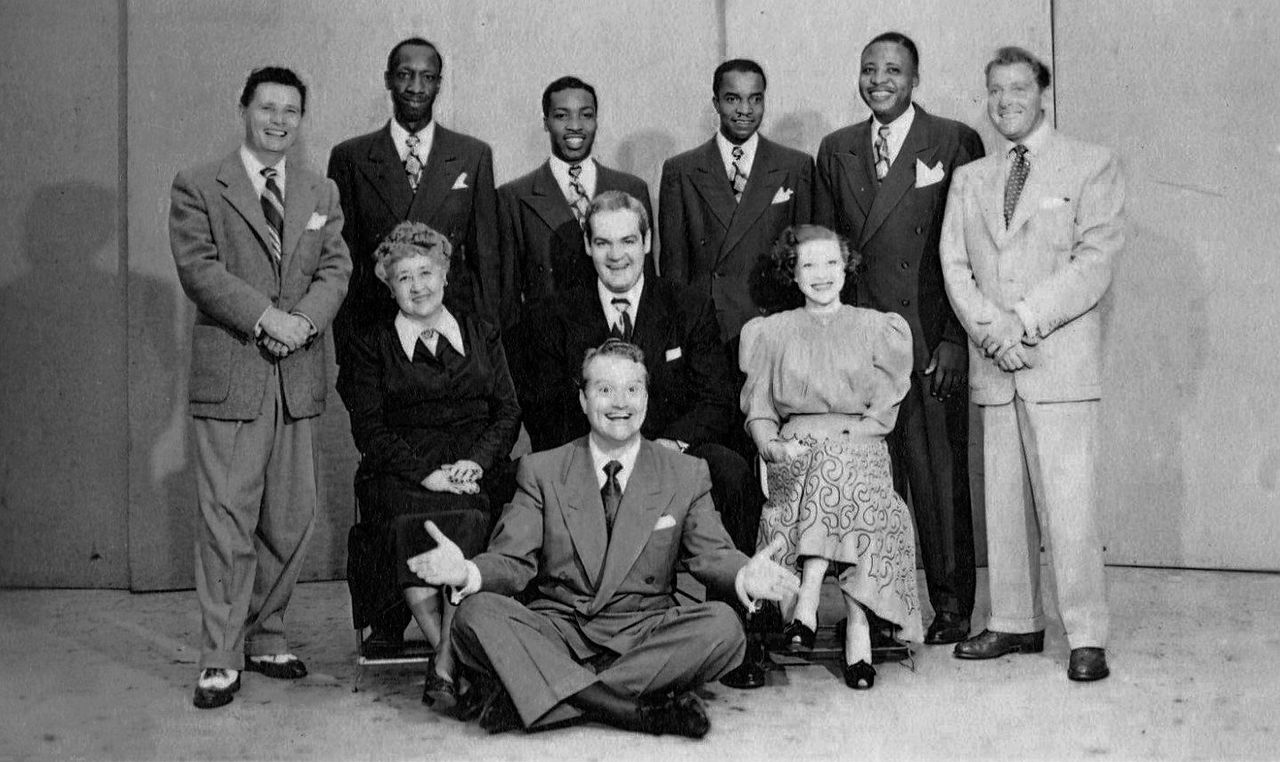Introduction to The Four Knights
The Four Knights had a prolific two-decade career as one of the in-demand doo-wop vocal groups especially during the 50s music era. They had performed throughout much of their career with the lineup consisting of Gene Alford (lead tenor), Oscar Broadway (bass), Clarence Dixon (baritone) and John Wallace (tenor), who also played guitar. The group was formed in 1943 from Charlotte, North Carolina. Originally, they performed as Southland Jubilee Singers, a jubilee quartet who sang gospel songs as well as pop and secular material. Their professional career started when they appeared at an NBC-owned WSDC radio station based in their hometown. Next they became featured performers on Carolina Hayride on WBT, owned by rival CBS. Then they issued their first recordings under Langworth Records in the mid-1940s, where they also changed their name to The Four Knights, manifesting their emphasis to perform in more pop-oriented material than gospel. The Four Knights moved to New York in 1945, where they performed on Arthur Godfrey’s radio program, and the following year secured a recording contract with Decca Records. Then the group appeared on Red Skelton’s radio program until the early 1950s. The Four Knights’ venture into Capitol Records in 1951 brought them considerable success, achieving many Top 20 hits – their singles such as “Oh Happy Day” (1954) and “I Get So Lonely (When I Dream About You)” both became Top 10 pop chart smashes. Due to a worsening illness, Alford was forced to retire from the group (he eventually died in 1960). Three years after Alford’s death, Dixon was next to leave. The group’s last charting single was “Oh Falling Star”, which peaked at the bottom of the Hot 100 in 1959. By the mid-1960s, The Four Knights disbanded.
Who were the Four Knights?
The Four Knights were an American doo-wop vocal act from Charlotte, North Carolina. Formed in 1943, Gene Alford (lead tenor), Oscar Broadway (bass), John Wallace (tenor, guitarist) and guitarist and Clarence Dixon (baritone). Just like any other doo-wop artists, The Four Knights initially started as a gospel group called the Southland Jubilee Singers. By that time, they were also doing some vocal pop and doo-wop numbers occasionally. In 1944 they became regular performers on the Charlotte-based radio station WSDC (NBC subsidiary), and featured performers on the CBS radio show Carolina Hayride.
The Four Knights’ recordings
Still as the Southland Jubilee singers, they were signed to Langworth Records in 1945. The group then recorded a number of both gospel and secular songs. However, they later changed their name to The Four Knights for a more secular appeal.
The Four Knights flew to New York later that year where they guested on Arthur Godfrey’s radio show. It was followed by a contract signing on Decca Records in 1946 which resulted into four singles until 1948. They also had a 39-week contract full season for the Red Skelton radio show. They went back on recording the following year, having signed to Coral Records (Decca’s subsidiary) until the contract’s expiration in 1950.
Starting to get known in the business
For much of 1951, the group finally started to get attention when they switched to Capitol Records. The Four Knights’ first three singles captured various chart positions: “I Love the Sunshine of Your Smile,” “(It’s No) Sin” and “Cry.” All of which were registered on the Billboard Hot 100 at #23, #14 and #21 respectively. Their first single on Capitol “I Love the Sunshine of Your Smile” was even reportedly used as a campaign song for the Republican Party. In addition, the launch of television as a new media provided a perfect timing for the group, and they were able to perform in several programs such as The Ed Sullivan Show.
The Four Knights’ bigger hits and Alford’s passing
Between 1953 and 1954, The Four Knights issued a couple of singles that would become bigger hits. “Oh, Happy Day” reached the Billboard Hot 100’s top 10, peaking at #8 while “I Get So Lonely” (When I Dream About You)” peaked at #2 on the Hot 100 and #5 in the British chart. In the midst of their fame, they performed with the legendary Nat King Cole on his hits such as “My Personal Possession” and “That’s All There Is to That.” Entering the mid 50’s, the lead tenor Alford left the group because was diagnosed with epilepsy, and his position was filled by Clifford Holland, formerly of Delta Rhythm Boys. Alford eventually died in 1960.
Later years
Returning to Coral in 1957, The Four Knights issued two LPs and several more singles. In 1959, they had their last hit “Oh Falling Star” which carted modestly at #83. They still managed to release singles in the 1960’s. In 1966, Dixon quit and it was followed by the group disbandment.
The tenor John Wallace died in 1978. On the other hand, Dixon and Broadway returned to Los Angeles where they spent their retirement.

